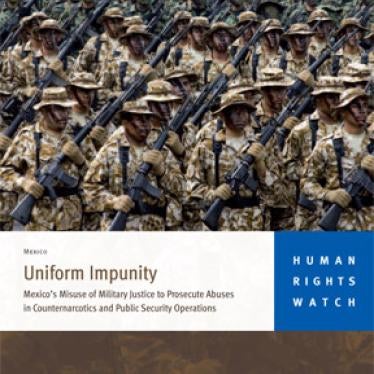Washington, DC
Fernando Francisco Gómez-Mont Secretary of the Interior México D.F.
Dear Secretary Gómez-Mont:
We are writing to express our deep concern regarding repeated threats against human rights defenders in Tijuana, Baja California. We think it is crucial that measures be undertaken immediately to ensure that these defenders can carry out their activities freely and safely. In particular, we hope that you will transfer responsibility for the patrols of their homes from the State Secretary of Public Security of Baja California to the Federal Secretary of Public Security, and that you will assign permanent federal bodyguards to the defenders and their families.
Blanca Mesina and Silvia Vázquez have received repeated death threats because of their work with 25 municipal police officers from Tijuana, who allege they were tortured by members of the Army and the police. Mesina, the daughter of one of the 25 officers, and Vázquez, a lawyer from the Comisión Ciudadana de Derechos Humanos del Noroeste (Citizens' Commission of Human Rights of the Northeast, or CCDH), represent many of the alleged victims.
Mesina and Vázquez said they and their family members have received menacing phone calls; that they have been followed by military vehicles and municipal police patrol cars; and that their homes have been photographed by plain-clothed individuals. In February, Vázquez's brother's car was firebombed outside of her parents' home with a Molotov cocktail. These incidents date back to November 5, 2009, when Mesina and members of Vázquez's organization testified in Washington in a hearing before the Inter-American Commission on Human Rights (IACHR) of the Organization of American States about abuses in Tijuana.
According to Mesina, the most recent incident occurred at approximately 6:00 pm on May 18, 2010, when a black pick-up truck began following her and repeatedly struck the back of her car. Mesina pulled into a parking lot, where the truck followed her. A hooded man wearing all black got out of the truck and approached her car, banging on her window until she opened it. "This is the last time I'm warning you to stop issuing complaints," the man said, according to Mesina. "You don't want to lose a family member."
The 25 municipal police officers Mesina and Vázquez represent allege they were arbitrarily detained in March 2009 and transported to a military base, where they were beaten, given electric shocks, and asphyxiated with plastic bags, among other forms of torture administered by the army and fellow municipal police officers.
In February, CCDH and the Comisión Mexicana de Defensa y Promoción de Derechos Humanos (Mexican Commission for the Defense and Promotion of Human Rights) requested protection for the defenders with Unidad para la Promoción y Defensa de Derechos Humanos (Division for the Promotion and Defense of Human Rights, or UPDDH), part of the Ministry of the Interior, as well as with the National Human Rights Commission and the State Human Rights Commission of Baja California. They have also solicited provisional measures (medidas cautelares) from the IACHR, which is currently reviewing their cases.
Both the National Human Rights Commission and the State Human Rights Commission of Baja California responded by soliciting protection measures for the defenders. As a result, on March 9, 2010, representatives of the UPDDH, together with representatives of the Federal and State Attorney General Offices, the Director of Public Security, the governor's office, the military, and other bodies, convened with Mesina and Vázquez to discuss security. Among other measures, the gathered parties agreed that: "the State Secretary of Public Security of Baja California will carry out the patrols that are conducted around the homes" of Mesina and Vázquez. These patrols were to take place three times a day.
However, in the weeks following the meeting, the state police routinely failed to carry out these patrols. It was not uncommon for several days to pass between patrols.
Mesina and Vázquez informed authorities about the irregularity of these patrols and ongoing threats in a second meeting on April 20, 2010, at which representatives of the UPDDH were present. In response, authorities concluded that the federal police would consider taking over the patrols, but that, in the meantime, the duty would continue to belong to state police. The defenders also requested the government provide them with permanent bodyguards to ensure their safety-a proposal which the authorities agreed to report back on within one week.
Since the second meeting, the state police have continued to lapse on carrying out the patrols. In fact, in the week prior to the most recent threat against Mesina, the state police had stopped conducting the patrols altogether. (Representatives of the governor's office informed the defenders that the state had to suspend the patrols indefinitely, because one of the officers who had been conducting them had been killed in a car accident.) Nor did the government follow up, in the time leading up to the attack, regarding the possibility of providing permanent guards, as it had agreed to do in the April 20 meeting.
As such, we strongly recommend that authority for these patrols be transferred immediately to the Federal Secretary of Public Security. Furthermore, in light of the persistence and seriousness of the threats, and the risk to the defenders, we respectfully urge you to assign permanent federal bodyguards to the defenders and their families, both when they are at home and when they travel. Finally, in order to ensure that the patrols and bodyguards fulfill their duties, we recommend you assign an officer within your ministry to check in regularly with Mesina and Vázquez.
We thank you for your attention to these serious concerns.
Sincerely,
José Miguel Vivanco
Americas Director
Human Rights Watch
CC: Arturo Chávez Chávez, Attorney General of Mexico CC: José Guadalupe Osuna Millán, Governor of Baja California CC: Raul Plascencia Villanueva, President of Mexico's National Commission of Human Rights CC: Arturo Sarukhan, Ambassador of Mexico to the United States CC: Carlos Pascual, United States Ambassador to Mexico







